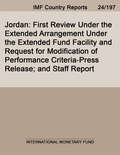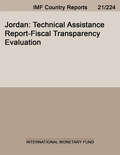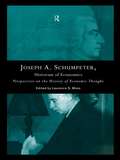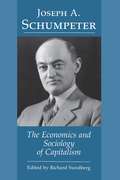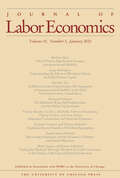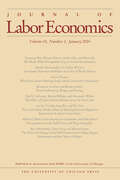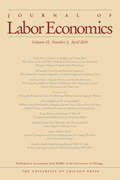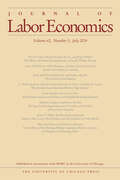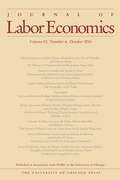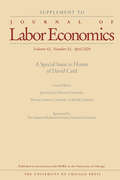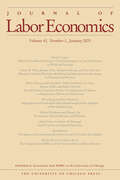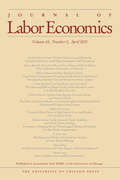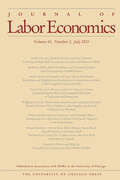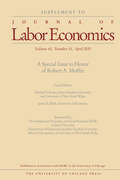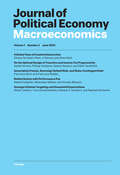- Table View
- List View
Jordan: First Review Under The Extended Fund Facility Arrangement And Request For A Waiver Of Nonobservance And Modifications Of Performance Criteria, And Rephasing Of Access-press Release; Staff Report; And Statement By The Executive Director For Jordan (Imf Staff Country Reports)
by International Monetary Fund. Middle East and Central Asia Dept.A report from the International Monetary Fund.
Jordan: Technical Assistance Report-Fiscal Transparency Evaluation (Imf Staff Country Reports)
by International Monetary Fund. Fiscal Affairs Dept.A report from the International Monetary Fund.
Joseph A. Schumpeter: Perspectives on the History of Economic Thought (Perspectives On The History Of Economic Thought Ser.)
by Laurence S. MossJoseph A. Schumpeter was one of the great economists of the twentieth century. His History of Economic Analsyis is perhaps the greatest contribution to the history of economics, providing a magisterial account of the development of the subject from Ancient Greece to the mid-twentieth century. Schumpeter's views on his predecessors have proved to be
Joseph A. Schumpeter: The Economics and Sociology of Capitalism
by Richard SwedbergThe renowned economist Joseph A. Schumpeter (1883-1950) made seminal contributions not only to economic theory but also to sociology and economic history. His work is now attracting wide attention among sociologists, as well as experiencing a remarkable revival among economists. This anthology, which serves as an excellent introduction to Schumpeter, emphasizes his broad socio-economic vision and his attempt to analyze economic reality from several different perspectives. An ambitious introductory essay by Richard Swedberg uses many new sources to enhance our understanding of Schumpeter's life and work and to help analyze his fascinating character. This essay stresses Schumpeter's ability to draw on several social sciences in his study of capitalism. Some of the articles in the anthology are published for the first time. The most important of these are Schumpeter's Lowell Lectures from 1941, "An Economic Interpretation of Our Time." Also included is the transcript of his lecture "Can Capitalism Survive?" (1936) and the high-spirited debate that followed. The anthology contains many of Schumpeter's classical sociological articles, such as his essays on the tax state, imperialism, and social classes. And, finally, there are lesser known articles on the future of private enterprise, on the concept of rationality in the social sciences, and on the work of Max Weber, with whom Schumpeter collaborated on several occasions.
Joseph Butler: A Preacher for Eighteenth-Century Commercial Society
by Daisuke Arie Masatake Okubo Naoki YajimaThis book is the first English-language monograph about Bishop Joseph Butler (1692–1752) by Japanese scholars. It is an especially interesting and controversial message coming as it does from Japan, a well-developed secular economic state where less than 1% of the population are Christians and opposing the recent trend of curtailing the eighteenth-century political economy into religiosity and theology. This multidisciplinary edited book presents a different and new perspective from the recent work of Oslington et al., which seeks to reduce the political economy of eighteenth- and nineteenth-century Britain to religiosity and theology, triggered by the writings of A. M. C. Waterman. Unlike those works, the present one aims to re-examine the largely forgotten Butler, who was said in the nineteenth century to be the most influential cleric and preacher in the Church of England of the previous century— not just as a clerical ideologue, but mainly as a proto-political economistbefore Adam Smith.In order to achieve this goal, first, the authors clarify that Butler's theory of conscience and probability, which began with passion and selfishness, was created with the development of eighteenth-century commercial society in mind. Second, the manner in which Butler's discourse was directed not at anti-Anglicans or eminent intellectuals, but at the majority of ordinary secular society, is explored. How it was consistent with and defended their sentiments and economic behavior, not only in Analogy but mainly in Fifteen Sermons, is also investigated and explained. Finally, readers see that Butler's antirational grasp of humanity and empiricist epistemology, based on “probability” presented in these inquiries, can in fact be considered a pioneering expression of the methodological premises of modern economics.
Joseph Locke: Civil Engineer and Railway Builder, 1805–1860
by Anthony BurtonMost historians recognize the work of three engineers as being the men who developed the railways from slow, lumbering colliery lines into fast, inter-city routes. Two are very well known: Robert Stephenson and Isambard Kingdom Brunel. The third was Joseph Locke, who should be recognized for having made a contribution just as great as that of the other two.The Locke family had been colliery managers and overseers for many generations and Joseph, once he had completed his very rudimentary education at Barnsley Grammar School at the age of thirteen, seemed set to follow in their footsteps. However, at the age of nineteen he was taken on as an apprentice by an old friend of his father, George Stephenson, and sent to the new locomotive works at Newcastle. His enthusiasm and willingness to learn soon brought promotion, and he became a highly valued assistant engineer on the prestigious Liverpool & Manchester Railway.During his time there he wrote a pamphlet with Robert Stephenson, arguing the case for steam locomotives and had the embarrassing task of having to correct calculations for a tunnel being built under the direct supervision of George Stephenson. After its opening, he moved on to work on the Grand Junction Railway, at the start working alongside Stephenson rather than as his assistant. But before long, they had quarrelled and the directors handed the whole works over to Lockes control. It was the turning point of his life.Locke was to continue as chief engineer on some of the most important lines in Britain, and his reputation grew to the point where he was also in demand for work in mainland Europe, building major routes in France, the Netherlands and Spain. He became a wealthy man, purchasing the manor of Honiton in Devon and sat in Parliament as the Liberal member for that constituency. He received many honors during his lifetime and died while on holiday at Scotland in 1860 at the age of fifty-five.
Josiah Wedgwood: A New Biography
by Anthony BurtonThe story of the innovative genius who became pottery maker to royalty—and to the world: &“You don't have to know a glaze from a slip to enjoy this.&” —Kirkus Reviews Born in Staffordshire, England, to a family of traditional potters in 1730, Josiah Wedgwood would grow up to revolutionize the industry, founding the company still world-renowned in the twenty-first century. When he started work, the local ware was either fairly rustic, or made to look a little more sophisticated by the addition of heavy glazes. He worked to produce a lighter colored body and to use designs made to appeal to aristocratic tastes, convinced that where they led the rapidly growing middle class would follow. The result was cream ware which, when a whole service was ordered by the royal family, was soon christened queens ware. But Wedgwood was a distinctive character for more reasons than his artistry. As a businessman, he adopted an early form of mass production, and is believed to be the inventor of many modern marketing techniques such as money-back guarantees and illustrated catalogs. He was also a passionate early abolitionist who used his company to promote the anti-slavery cause, and he pursued the study of chemistry in order to understand the science behind the potter&’s art, eventually inventing a kiln thermometer. This fascinating biography brings to life a remarkable eighteenth-century figure.
Josiah Wedgwood: A New Biography
by Anthony BurtonThe story of the innovative genius who became pottery maker to royalty—and to the world: &“You don't have to know a glaze from a slip to enjoy this.&” —Kirkus Reviews Born in Staffordshire, England, to a family of traditional potters in 1730, Josiah Wedgwood would grow up to revolutionize the industry, founding the company still world-renowned in the twenty-first century. When he started work, the local ware was either fairly rustic, or made to look a little more sophisticated by the addition of heavy glazes. He worked to produce a lighter colored body and to use designs made to appeal to aristocratic tastes, convinced that where they led the rapidly growing middle class would follow. The result was cream ware which, when a whole service was ordered by the royal family, was soon christened queens ware. But Wedgwood was a distinctive character for more reasons than his artistry. As a businessman, he adopted an early form of mass production, and is believed to be the inventor of many modern marketing techniques such as money-back guarantees and illustrated catalogs. He was also a passionate early abolitionist who used his company to promote the anti-slavery cause, and he pursued the study of chemistry in order to understand the science behind the potter&’s art, eventually inventing a kiln thermometer. This fascinating biography brings to life a remarkable eighteenth-century figure.
Journal of Labor Economics, volume 41 number 1 (January 2023)
by Journal of Labor EconomicsThis is volume 41 issue 1 of Journal of Labor Economics. Founded in 1983 as the first journal devoted specifically to labor economics, the Journal of Labor Economics (JOLE) presents international research on issues affecting social and private behavior, and the economy. JOLE’s contributors investigate various aspects of labor economics, including supply and demand of labor services, personnel economics, distribution of income, unions and collective bargaining, applied and policy issues in labor economics, and labor markets and demographics.
Journal of Labor Economics, volume 41 number 2 (April 2023)
by Journal of Labor EconomicsThis is volume 41 issue 2 of Journal of Labor Economics. Founded in 1983 as the first journal devoted specifically to labor economics, the Journal of Labor Economics (JOLE) presents international research on issues affecting social and private behavior, and the economy. JOLE’s contributors investigate various aspects of labor economics, including supply and demand of labor services, personnel economics, distribution of income, unions and collective bargaining, applied and policy issues in labor economics, and labor markets and demographics.
Journal of Labor Economics, volume 41 number 3 (July 2023)
by Journal of Labor EconomicsThis is volume 41 issue 3 of Journal of Labor Economics. Founded in 1983 as the first journal devoted specifically to labor economics, the Journal of Labor Economics (JOLE) presents international research on issues affecting social and private behavior, and the economy. JOLE’s contributors investigate various aspects of labor economics, including supply and demand of labor services, personnel economics, distribution of income, unions and collective bargaining, applied and policy issues in labor economics, and labor markets and demographics.
Journal of Labor Economics, volume 41 number 4 (October 2023)
by Journal of Labor EconomicsThis is volume 41 issue 4 of Journal of Labor Economics. Founded in 1983 as the first journal devoted specifically to labor economics, the Journal of Labor Economics (JOLE) presents international research on issues affecting social and private behavior, and the economy. JOLE’s contributors investigate various aspects of labor economics, including supply and demand of labor services, personnel economics, distribution of income, unions and collective bargaining, applied and policy issues in labor economics, and labor markets and demographics.
Journal of Labor Economics, volume 41 number S1 (October 2023)
by Journal of Labor EconomicsThis is volume 41 issue S1 of Journal of Labor Economics. Founded in 1983 as the first journal devoted specifically to labor economics, the Journal of Labor Economics (JOLE) presents international research on issues affecting social and private behavior, and the economy. JOLE’s contributors investigate various aspects of labor economics, including supply and demand of labor services, personnel economics, distribution of income, unions and collective bargaining, applied and policy issues in labor economics, and labor markets and demographics.
Journal of Labor Economics, volume 42 number 1 (January 2024)
by Journal of Labor EconomicsThis is volume 42 issue 1 of Journal of Labor Economics. Founded in 1983 as the first journal devoted specifically to labor economics, the Journal of Labor Economics (JOLE) presents international research on issues affecting social and private behavior, and the economy. JOLE’s contributors investigate various aspects of labor economics, including supply and demand of labor services, personnel economics, distribution of income, unions and collective bargaining, applied and policy issues in labor economics, and labor markets and demographics.
Journal of Labor Economics, volume 42 number 2 (April 2024)
by Journal of Labor EconomicsThis is volume 42 issue 2 of Journal of Labor Economics. Founded in 1983 as the first journal devoted specifically to labor economics, the Journal of Labor Economics (JOLE) presents international research on issues affecting social and private behavior, and the economy. JOLE’s contributors investigate various aspects of labor economics, including supply and demand of labor services, personnel economics, distribution of income, unions and collective bargaining, applied and policy issues in labor economics, and labor markets and demographics.
Journal of Labor Economics, volume 42 number 3 (July 2024)
by Journal of Labor EconomicsThis is volume 42 issue 3 of Journal of Labor Economics. Founded in 1983 as the first journal devoted specifically to labor economics, the Journal of Labor Economics (JOLE) presents international research on issues affecting social and private behavior, and the economy. JOLE’s contributors investigate various aspects of labor economics, including supply and demand of labor services, personnel economics, distribution of income, unions and collective bargaining, applied and policy issues in labor economics, and labor markets and demographics.
Journal of Labor Economics, volume 42 number 4 (October 2024)
by Journal of Labor EconomicsThis is volume 42 issue 4 of Journal of Labor Economics. Founded in 1983 as the first journal devoted specifically to labor economics, the Journal of Labor Economics (JOLE) presents international research on issues affecting social and private behavior, and the economy. JOLE’s contributors investigate various aspects of labor economics, including supply and demand of labor services, personnel economics, distribution of income, unions and collective bargaining, applied and policy issues in labor economics, and labor markets and demographics.
Journal of Labor Economics, volume 42 number S1 (April 2024)
by Journal of Labor EconomicsThis is volume 42 issue S1 of Journal of Labor Economics. Founded in 1983 as the first journal devoted specifically to labor economics, the Journal of Labor Economics (JOLE) presents international research on issues affecting social and private behavior, and the economy. JOLE’s contributors investigate various aspects of labor economics, including supply and demand of labor services, personnel economics, distribution of income, unions and collective bargaining, applied and policy issues in labor economics, and labor markets and demographics.
Journal of Labor Economics, volume 43 number 1 (January 2025)
by Journal of Labor EconomicsThis is volume 43 issue 1 of Journal of Labor Economics. Founded in 1983 as the first journal devoted specifically to labor economics, the Journal of Labor Economics (JOLE) presents international research on issues affecting social and private behavior, and the economy. JOLE’s contributors investigate various aspects of labor economics, including supply and demand of labor services, personnel economics, distribution of income, unions and collective bargaining, applied and policy issues in labor economics, and labor markets and demographics.
Journal of Labor Economics, volume 43 number 2 (April 2025)
by Journal of Labor EconomicsThis is volume 43 issue 2 of Journal of Labor Economics. Founded in 1983 as the first journal devoted specifically to labor economics, the Journal of Labor Economics (JOLE) presents international research on issues affecting social and private behavior, and the economy. JOLE’s contributors investigate various aspects of labor economics, including supply and demand of labor services, personnel economics, distribution of income, unions and collective bargaining, applied and policy issues in labor economics, and labor markets and demographics.
Journal of Labor Economics, volume 43 number 3 (July 2025)
by Journal of Labor EconomicsThis is volume 43 issue 3 of Journal of Labor Economics. Founded in 1983 as the first journal devoted specifically to labor economics, the Journal of Labor Economics (JOLE) presents international research on issues affecting social and private behavior, and the economy. JOLE’s contributors investigate various aspects of labor economics, including supply and demand of labor services, personnel economics, distribution of income, unions and collective bargaining, applied and policy issues in labor economics, and labor markets and demographics.
Journal of Labor Economics, volume 43 number S1 (April 2025)
by Journal of Labor EconomicsThis is volume 43 issue S1 of Journal of Labor Economics. Founded in 1983 as the first journal devoted specifically to labor economics, the Journal of Labor Economics (JOLE) presents international research on issues affecting social and private behavior, and the economy. JOLE’s contributors investigate various aspects of labor economics, including supply and demand of labor services, personnel economics, distribution of income, unions and collective bargaining, applied and policy issues in labor economics, and labor markets and demographics.
Journal of Political Economy Macroeconomics, volume 1 number 2 (June 2023)
by Journal of Political Economy MacroeconomicsThis is volume 1 issue 2 of Journal of Political Economy Macroeconomics. Journal of Political Economy Macroeconomics (JPE Macro) strives to publish high-quality theoretical and empirical research papers that address issues of relevance to macroeconomics. Macroeconomics is interpreted in a broad sense and includes issues related to the traditional macroeconomic topics of growth, fluctuations, and distribution, as well as issues that connect and interact with topics from monetary economics, labor economics, finance, trade, international economics, industrial organization, political economy, public finance, and development economics.
